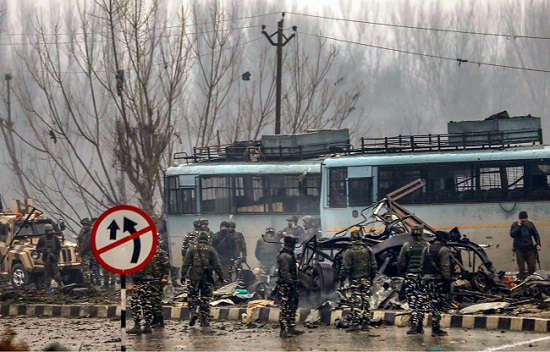
Amidst all the war frenzy, the big question is who do you fight – Pakistan or also the Taliban, Jaish-e-Mohammed and other riff-raff elements?
The Pulwama blasting of CRPF jawans has caused remorse and frenzy for revenge. There is cry of teaching Pakistan a lesson. Many want a war. Indians are hurt. It’s blow on the nation. Howsoever anyone wants, the solution is not easy. The situation today is more complex than in 1971, when Bangladesh was created despite radicalization even at that time. There are many non-state actors. India has military preparedness but a war is expensive and not just in cash.
The sub-continent is passing through severe uncertainty as the neighbouring nations – Iran, Afghanistan, China are changing track every now and then. US is in a hurry to withdraw its troops from Afghanistan, and Taliban is flexing muscles. Russia and Iran are not shy of a deal with Taliban. Will the Taliban take control of Afghanistan, where India has invested huge sums as also in diplomacy, as the US withdraws? It may be seen as yet another failure of the US after Vietnam, Somalia, Iraq and Syria. Since 2001, after spending billions, the US controls not even half of Afghanistan. The Afghan soldiers and civilian casualties are heavy. The Saudi Arabia, Qatar and UAE are working out the face-saving for the US for its withdrawal. They are also pressurizing Pakistan to help as also providing financial aid to boost its forex reserves touching low of $6 billion. Saudi Arabia is giving $32 billion to Islamabad.
Apart from this the big money plays its role. It is not just the nation states that are pouring funds – in fact they, including the US, are having trouble arranging it. India is just next to a troubled Western Asia singed by ISIS. The ISIS war is being fought not for a “holy cause of jihad”. The terror is complex mix of arms-drug peddlers, cyber frauds, human traffickers and other hegemonists. The motivators of school girls from Europe to West Asia rake in huge money bags for turning them as sex fodder for marauders. It generates illicit funds.
Conflict is rising in northern borders of Pakistan. Even Iran lost 28 soldiers in a blast on its borders with Pakistan on February 12. Frenzy is there too. Iran also vowed retribution. The sub-continent is on a tinder box. A war is too complex. Astute diplomacy is needed to save India’s economic assistance and friends in Afghanistan and Iran. Taliban resurgence is a problem for Islamabad. It fears losing its might to it. Moreover, the tribal regions on Pakistan borders are on ferment with sub-nationalism. Slight change in equilibrium would cause major problems for India and other states in the region.
An aggressive diplomacy, lobbying, negotiations, and operations need huge investment as also manpower. The conflict with Pakistan costs 3% of India’s GDP, according to Indian think tank Strategic Foresight Group in 2004. India lost 3843 soldiers in 1971 and captured 93,000 soldiers. Almost a million person were in India as refugees. It had bled the economy then. Various surcharges were levied. Even on each postal item a 5-paise special refugee surcharge had to be affixed. The post-1971 war costs were higher. It had caused over 13% inflation and severe unrest. The imposition of internal emergency was another fall-out.
The proxy war since 1990 has claimed more casualties and economic cost be it in Kashmir, Kargil conflict 1999, Parliament attack in 2001, Mumbai-attack 2008 or subsequent several other blasts and raids. Military and civilian casualties are more than it was in full-fledged wars in 1965 and 1971. It is estimated that since December 2001 every year almost $600 million is spent to protect the western border. Pakistan spending is estimated to be a little less but it is higher in percentage terms for its GDP and geographical area. Carnegie Foundation has stated that even not fighting a war has a cost that is not less than an actual war. The Federation of Indian Chambers for Commerce and Industry (FICCI) estimated a huge business cost to the ongoing Indo-Pak conflict.
So what does Pakistan gain? A conflict with India, be it for Gen Zia ul Haq or Gen Parvez Musharraf has been huge economic gains in assistance from West Asia, the US and the West. US despite the World Trade Center attack considered Pakistan a strategic ally and gave Musharraf enormous aid. Even Donald Trump is doing it today. India-baiting is survival technique for the artificial state. Chinese support to Jaish-e-Mohammed operator Masood Azhar is a testimony. Chinese move is said to keep India under pressure. It is also said that saving Azhar is its insurance for checking terror by Muslim Uighurs in Xinjiang.
For India, apart from financial and political cost there is human misery. Certain powers want the rogue state to survive as they have business, territorial and other interests. India has to chart out a new course. A war may not be easy but breaking the tentacles of those who lead to war is a necessity. India has to re-strategize and ensure global alliance to break the backbone of terror and its illicit funding.
